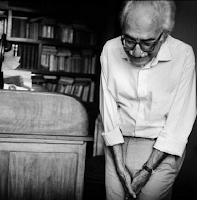 |
| Manoel de Barros. Source: M. Buainain/CG News. |
Short biography
Manoel Wenceslau Leite de Barros (born 1916 in Cuiabá, Mato Grosso, Brazil - died 2014 in Campo Grande, Mato Grosso do Sul) was a poet, farmer, and lawyer.Manoel would rather be a tree than a human, so he would not have birthdays.
He spent his early childhood enjoying country life in Pantanal, the vastest wetland in the world. Manoel learned how to read and write at home with an aunt. Later, he attended boarding schools, first in Cuiabá, the state capital of Mato Grosso, in 1924, then at a Catholic school in Rio de Janeiro.
It was during this time that he came into contact with literature. Once, as punishment for misbehaving, he was forced to read sermons by Antônio Vieira. It fascinated him.
In 1934, after joining the Brazilian Communist Party, Manoel almost went to jail. A group of friends and party members went graffitiing communist messages in Rio and were busted by the police. An officer came to the pension where Manoel and his friends lived to arrest him.
The pension owner, a Hungarian woman, tried to persuade the man to let Manoel stay. Not only had he recently finished a secondary Catholic school, but he had also written a poetry book, she said. Manoel handed the book over to the police officer, who agreed to leave him be.
So Manoel's first book was written but never published. He stayed in Rio de Janeiro until completing a bachelor's degree at Niterói's (a city next to Rio) Faculty of Law in 1940. However, his career in law would be very short. He could not stand a jury or speaking in public as a consequence of being extremely shy.
His first book was published in 1937. The second one, in 1942. Not long after, disillusioned, Manoel abandoned the Communist Party and dropped advocacy. He decided to travel abroad, and between 1943 and 1945, he visited Bolivia, Peru, Europe, and the United States.
Back in Brazil, Manoel got married in 1947, having three children. After his father passed away, he inherited a farm in Pantanal. Encouraged by his wife, they moved to the farm. He stopped writing during the next decade, and no book was published in the 1950s.
From 1960 on, Manoel resumed his writings, publishing more than 20 books.
It was during this time that he came into contact with literature. Once, as punishment for misbehaving, he was forced to read sermons by Antônio Vieira. It fascinated him.
In 1934, after joining the Brazilian Communist Party, Manoel almost went to jail. A group of friends and party members went graffitiing communist messages in Rio and were busted by the police. An officer came to the pension where Manoel and his friends lived to arrest him.
The pension owner, a Hungarian woman, tried to persuade the man to let Manoel stay. Not only had he recently finished a secondary Catholic school, but he had also written a poetry book, she said. Manoel handed the book over to the police officer, who agreed to leave him be.
So Manoel's first book was written but never published. He stayed in Rio de Janeiro until completing a bachelor's degree at Niterói's (a city next to Rio) Faculty of Law in 1940. However, his career in law would be very short. He could not stand a jury or speaking in public as a consequence of being extremely shy.
His first book was published in 1937. The second one, in 1942. Not long after, disillusioned, Manoel abandoned the Communist Party and dropped advocacy. He decided to travel abroad, and between 1943 and 1945, he visited Bolivia, Peru, Europe, and the United States.
Back in Brazil, Manoel got married in 1947, having three children. After his father passed away, he inherited a farm in Pantanal. Encouraged by his wife, they moved to the farm. He stopped writing during the next decade, and no book was published in the 1950s.
From 1960 on, Manoel resumed his writings, publishing more than 20 books.
List of poetry books
Poemas concebidos sem pecado (1937), Face imóvel (1942), Poesias (1947), Compêndio para uso dos pássaros (1960), Gramática expositiva do chão (1966), Matéria de Poesia (1970), Arranjos para assobio (1980), Livro de pré-coisas (1985), O guardador de águas (1989), Concerto a céu aberto para solos de ave (1991), O livro das ignorãças (1993), Livro sobre nada (1996), Retrato do artista quando coisa (1998), Exercícios de ser criança (1999), Ensaios fotográficos (2000), Tratado geral das grandezas do ínfimo (2001), O fazedor de amanhecer (2001), Cantigas por um passarinho à toa (2003), Poemas rupestres (2004), Poeminha em Língua de brincar (2007), e Menino do mato (2010).
Tags:
Biography